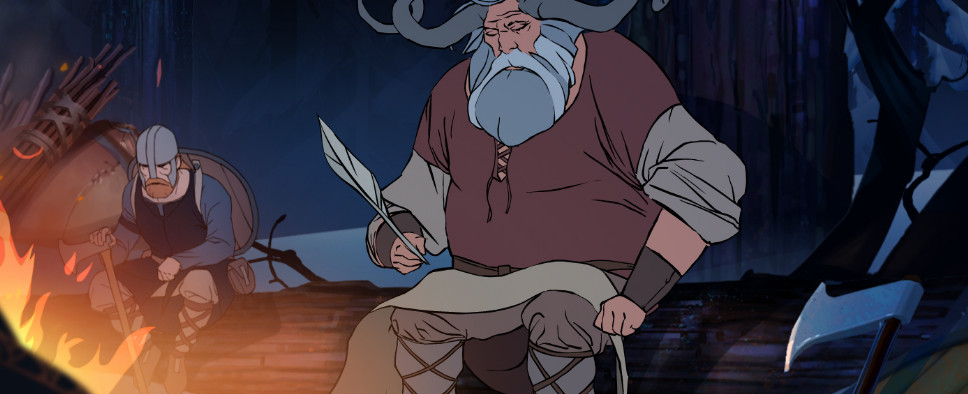The Banner Saga Review
-
Category: ReviewsHits: 12421

Article Index
The Banner Saga is a turn-based tactical RPG funded by a Kickstarter crowdfunding campaign and developed by Stoic, an indie studio formed by three ex-BioWare Austin developers. It's a bold title that makes a very strong first impression, thanks to its art style, strongly inspired by Eyvind Earle (especially known for his work on Disney animation in the 1950s), and to its unusual gameplay structure, which replaces the classic player-driven exploration and quest-based progression with the management of a caravan of refugees on a long and possibly doomed journey.
In other words, if there's something The Banner Saga can't be accused of, is of being a me-too trend follower. This refreshing attitude did a lot for my enjoyment of the game, but it couldn't hide some deep faultlines in the game's design, especially (but not only) concerning its controversial combat system.
Notes: For the sake of full disclosure, it's worth noting that I backed The Banner Saga during its Kickstarter campaign and that I played the game through completion before the release of its first patch, which added a few missing functionalities and rebalanced the later sections of the game in response to players' complaints.
A Viking Candy Saga
The Banner Saga takes place in a fantasy setting liberally inspired by the Norse sagas of yore, with an apocalyptic tinge to its pitch: the Gods are dead, and recently the sun has stopped dead in its tracks, locking the lands in an eternal day. Things take a turn for the worse when, from the perspective of two distinct groups made of pre-made unique characters, you witness the beginnings of what seems to be a full-scale Dredge invasion, the Dredge being an enigmatic race of silent black-armor-clad giants that seem unbeatable, and already caused trouble to the humans and Varls (a race of horned giants) in the past.
It's a story that seems doomed not to end well, one that plunges you into the events from the very beginning with little regard for your confusion, expecting you to be able to immediately make choices that will carry heavy consequences for the characters you've just met. While the finer details of the game's lore can take a while to pick up, the broad strokes are simple enough to understand, and Stoic has done a good job at giving the players the information they need without resorting to exposition dumps, with very few exceptions. As I've said, the choices you make all have an impact too, and the game does an exceedingly good job at putting you into the shoes of a leader forced to make tough calls in a desperate situation, having to deal with the perils of battle on one hand, and starvation and illness on the other.
All that said, I couldn't help but notice that it took me longer to get inside the character's heads than the game expected me to, which made the first hours of the game feel a bit hollow and artificial, a feeling I suspect I wouldn't experience again were I to replay the title. There's also a certain occasional element of "guessing what the designers intended" in some choices that can feel frustrating, especially considering the gameplay consequences can be massive and lock you out of characters you had come to rely on in battle. The Banner Saga is a tragic story, so I never expected the choices to be "fair", but rather unfair in a way that makes sense, and I feel the developers occasionally missed the mark in that respect.
However, as long as you're willing to accept the consequences of your action and approach the story as a story rather than a game, it works. It's just a pity that, being the first title of a planned trilogy, the game ends quite abruptly and without a proper resolution at the 10-hour mark, because I had grown to care about its characters: whether I was dealing with abrasive princes, caring fathers, regretful war heroes, or mysterious "Menders", they all made an impression and convincingly populated the game's beautiful, dying world.
Marching On
Roughly half, if not more, of the time I spent playing The Banner Saga wasn't spent in combat, but managing my caravan. On its face, it's simple, even basic gameplay: watch your caravan travel through gorgeously painted stylized landscapes, keeping an eye on the Supplies (the more people you have, the faster they are consumed; should they reach 0 your people will start dying of starvation) and their Morale, taking stops to rest at your Camp (where you can also experiment with strategies in mock battles and occasionally involve yourself in optional conversations) as often as possible to avoid depressing your characters to the point of affecting their combat capabilities (low Morale gives maluses to the characters' Willpower, a resource used to power special attacks). To help spice up things and avoid infuriating players with the slow pace of the caravan travels, the folks at Stoic have filled the game with a respectable number of text-only events modeled on King of Dragon Pass, that range from dealing with possibly poisoned supplies, to stopping fights between your people, to deciding whether it's better to celebrate a childbirth to raise morale or carefully spare your supplies for times of hardship.


